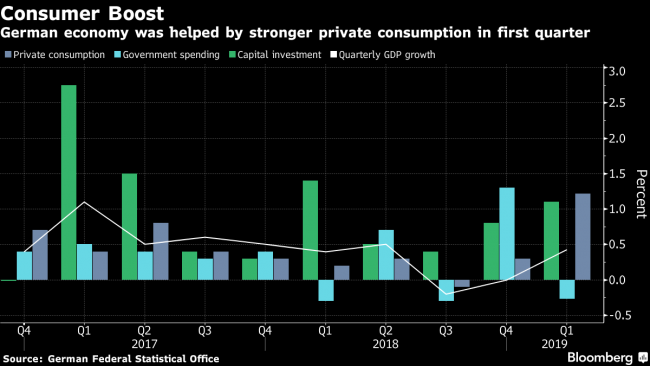(Bloomberg) -- Consumers led Europe’s largest economy out of stagnation at the start of the year, as the biggest spending increase in almost eight years made up for a manufacturing slump and troubles plaguing automakers.
Helped by record-low unemployment, low inflation and supportive fiscal measures, German household spending climbed 1.2% in the first quarter, the most since 2011. Construction and capital investment both gained, while net trade contributed 0.2 percentage point as exports outpaced imports.
The economy grew 0.4% in the period. Economists see a slightly slower expansion this quarter as the construction boost probably won’t be repeated, manufacturing continues to suffer, and escalating global trade tensions could dent the export-heavy economy.
The Bundesbank said this week that the strong consumer spending was probably temporary as expansive fiscal measures introduced at the start of the year supported purchasing power, with the effect likely to fade this quarter. Other measures may reach households in the second half of 2019, it said.
There’ll be more insight into the economy later on Thursday with the release of Purchasing Managers Indexes and the closely-watched Ifo business confidence gauge. In France, a gauge of factory confidence jumped in May to to a level not seen in six months, and manufacturers sharply revised up their production expectations.
The German central bank has also cautioned against reading too much into the first-quarter performance, saying the economy’s underlying trend remains weak and the downturn in industry could even intensify. At the same time, a prolonged decline in inventories suggests the biggest disruptions from one-offs should be over, according to Carsten Brzeski, chief economist at ING Germany.
The key concern is the flare-up in a trade conflict between the U.S. and China that the OECD says has put the the global economy on a low-growth track that’s clouded by risks.
Germany and the euro zone have so far managed to escape a direct hit from U.S. protectionism, but the region could still be dragged into the conflict, with significant consequences for Germany’s auto sector. President Donald Trump earlier this month delayed imposing tariffs on car imports from the European Union and Japan for 180 days, while saying they represent a threat to U.S. national security.
(Updates with Bundesbank in fourth paragraph, French manufacturing in fifth.)
